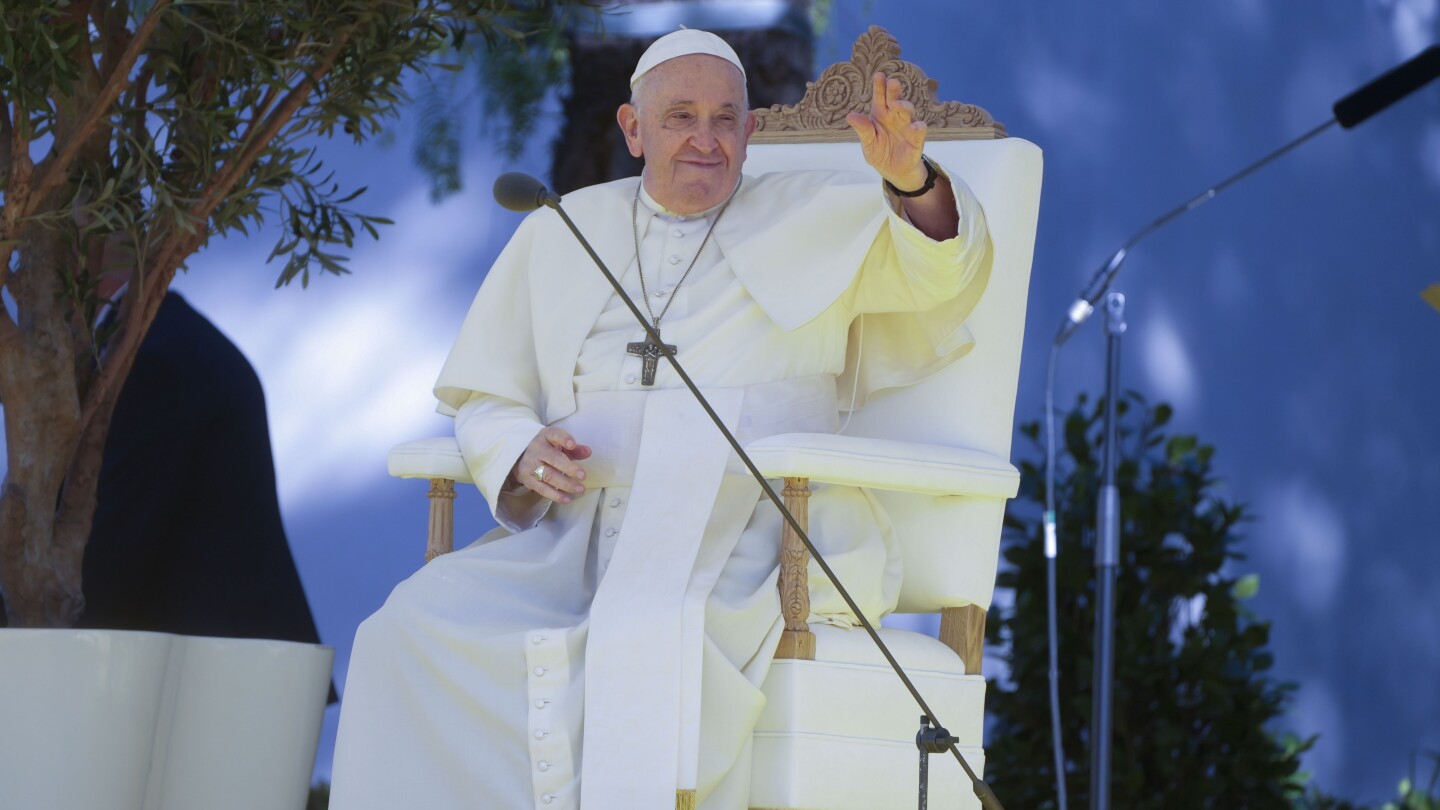LISBON, Portugal (AP) — Pope Francis challenged university students on Thursday to make the world a more just and inclusive place, as he focused the second day of his Portugal trip on inspiring young people to use their privilege to combat global warming and economic inequalities.
Francis received a warm welcome at the Catholic University, one of Portugal’s top institutions of higher learning, where students broke into periodic papal chants under an already bright sun on the central Lisbon campus.
After the event, Francis was heading to the seaside town of Cascais to visit the local branch of his Scolas Occurrentes foundation, a movement he founded years ago to bring young people from different backgrounds and nationalities together.
Francis is in Lisbon through the weekend to attend World Youth Day, the big Catholic jamboree that St. John Paul II launched in the 1980s to encourage young Catholics in their faith. Francis has picked up John Paul’s mantle with gusto as he seeks to inspire the next generation to rally behind his key social justice, economic and environmental priorities.
In his remarks Thursday, Francis urged the students to take risks and reject the temptation to merely perpetuate the status quo — the “present global system of elitism and inequality” — with an attitude of self-preservation.
“An academic degree should not be seen merely as a license to pursue personal well-being, but as a mandate to work for a more just and inclusive — that is, truly progressive — society,” he said.
Francis urged the students to instead use the privilege of their education to work for the common good, especially in caring for the environment, the poor and marginalized. He said that current promises to curb global warming have amounted to mere “halfway measures (that) simply delay the inevitable disaster.”
“Yours can be the generation that takes up this great challenge. You have the most advanced scientific and technological tools, but please, avoid falling into the trap of myopic and partial approaches,” he said.
“We need to align the tragedy of desertification with that of refugees, the issue of increased migration with that of a declining birth rate, and to see the material dimension of life within the greater purview of the spiritual.”
Rather than polarized approaches, Francis said, “We need a unified vision, a vision capable of embracing the whole.”
Many young Catholics around the world have embraced some of Francis’ core teachings about correcting economic injustices and promoting environmental custodianship, joining church-sponsored foundations and social movements under the banner of the “Economy of Francesco” the “Global Compact on Education” and the “Laudato Sii” movement, named for Francis’ 2015 encyclical on the environment.
Thursday’s event was punctuated by testimonies from students, including one who first fled her native Iran for Ukraine, and then fled Russia’s war for Portugal. Periodically the students broke into the Portuguese version of the classic World Youth Day chant of “This is the youth of the pope.”
“I think that all the young people feel very close and very friendly even with the pope,” said Mathilde Laborinho, who attended the university event. “And it’s very nice to see that he comes here and has a little meeting.”
Francis arrived in Lisbon on Wednesday and dove head-on into Portugal’s clergy sexual abuse crisis, which has intensified after a panel of experts hired by Portugal’s bishops reported in February that priests and other church personnel may have abuse at least 4,815 boys and girls since 1950.
Meeting with the country’s bishops at Lisbon’s iconic Jeronimos Monastery, Francis blasted the “scandal” of sexual abuse, which he said had marred the face of the church and helped drive the faithful away. He told the bishops that victims must always be welcomed and heard.
After nightfall, after a long day of travel and protocol visits, Francis met for more than an hour with 13 victims at the Vatican embassy, listening to their traumas, the Vatican said.
The encounter, which had been expected since Francis met with survivors on previous trips abroad, was aimed at trying to help the Portuguese hierarchy and faithful come to terms with the church’s own legacy of abuse and coverup after many other European countries have gone through similar reckonings.
The response by Portugal’s bishops to the expert report’s findings, however, has in some ways added to the problem. Prior to the report, Portuguese church officials had insisted there were only a handful of child sex abuse cases. After the document’s release, the bishops initially refused to remove named abusers from ministry and said they would only compensate victims if courts ordered them to.
___
Associated Press religion coverage receives support through the AP’s collaboration with The Conversation US, with funding from Lilly Endowment Inc. The AP is solely responsible for this content.

